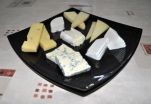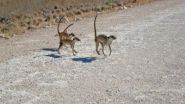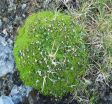(Press-News.org) Researchers at the University of Las Palmas de Gran Canaria (Spain) have analysed more than 60 brands of cheese commonly available in supermarkets. The concentration of organochloride contaminants in the majority of the samples was lower than levels set by European legislation, but in a few cases it was higher. The scientists recommend that an eye is kept on polychlorinated biphenyls as they are carcinogenic. The majority of these compound concentrations appeared in organic cheeses.
"In general, chloride contaminant residue levels were low in the cheese samples that we analysed, complying with limits set out by Spanish and European legislation, except in a few cases," as explained to SINC by Luis Domínguez-Boada and Octavio Pérez-Luzardo, those in charge of the Environment and Health Research Group (Toxicology Unit) of the University of Las Palmas de Gran Canaria.
For more than a year, a team at the university analysed 61 common brands of cheese (54 conventional and 7 organic) and they found that in a small amount the 'dioxin-like polychlorinated biphenyls' (dioxin-like PCBs or DL-PCBs) exceeded EU-established levels.
Recommendations state that levels of this contaminant should not exceed 3 picograms WHO-TEQ per gram of cheese fat, but in some samples up to 76 pg WHO-TEQ/g were detected. The TEQ (toxic equivalent) value is a toxicity measurement promoted by the World Health Organisation (WHO).
This organisation also recommends that 'tolerable daily intake' is lower than 2 pg WHO-TEQ of dioxins and dioxin-like compounds per kilogram of body weight. "But if the most contaminated brands of cheese are consumed then this quantity could be exceeded, thus implying an increased possibility of harmful health effects," warns Doctor Domínguez-Boada.
The risks caused by the continued intake of chloride contaminants have not yet been unequivocally confirmed but their carcinogenicity and mutagenicity are known, or in other words how they can cause cancer and induce DNA mutations, respectively. It is also known that they act as endocrine disruptors that alter our delicate hormonal balance.
These compounds also have a negative effect on the metabolism. In fact they are diabetogenic and obesogenic, which means excess intake increases the risk of suffering from diabetes and obesity.
Transferable Results
A total of 100% of analysed samples had quantifiable levels of polychlorinated biphenyls (PCBs). Published in the 'Food and Chemical Toxicology' journal, the results according to the authors can be extrapolated to cheese in the rest of Spain and Europe since common brands sold in any supermarket were analysed.
But how do these harmful substances end up in cheeses? The organochloride compounds make up the pesticides and contaminating emissions from industry. From here they are then transferred to the environment and end up in the milk of animals.
In the case of the PCBs, their use was prohibited in the 1970s but they are stable molecules that have survived since then. One of the most surprising results of the study is that the highest concentrations of these substances have been found in organic cheeses but are marketed as being more ecological and healthier.
According to the authors, the explanation lies in the fact that they come from very industrialised countries (the Netherlands, Belgium and Germany) where polychlorinated biphenyls are present in the environment despite them being banned.
"Contaminating doesn't come free," reminds Domínguez-Boada, who wonders whether the removal of old devices with PCBs, such as many electrical transformers, is being done in a controlled fashion across the whole world.
In any case, the researcher believes that in the next few years the PCBs will gradually disappear from ecological cheeses, "but this is not the case for the pesticides in conventional cheeses unless measures are taken."
The authors recommend that an assessment is conducted on the presence of these ubiquitous toxic substances in the environment with the aim of establishing control measures like those outlined in the Stockholm Convention on Persistent Organic Pollutants backed by the United Nations Environment Programme (UNEP).
"Food controls should also be increased, assessing the presence of all harmful chemical residues regardless of whether or not they are banned or used in the dairy sector. Those brands or batches with high pollutant levels that pose a risk to the consumer can then be withdrawn from the market."
The researchers declare that the study has no conflict of interest and that on this occasion they have not concentrated on what brands are the most polluted. "At the moment this consists of a specific study displaying the presence of organochloride toxic compounds in our cheeses," says Pérez-Luzardo. "The results can vary according to batch and over time. A more of a long-term study is therefore required to confirm if the same brand always has the same levels."
In Western countries it is calculated that around 30% of organochloride pollutant intake comes from dairy products due to their high fat content. The rest comes above all from fish but it has also been detected in meat and eggs.
INFORMATION:
References:
Maira Almeida-González, Octavio P. Luzardo, Manuel Zumbado, Ángel Rodríguez-Hernández, Norberto Ruiz-Suárez, Marta Sangil, María Camacho, Luis A. Henríquez-Hernández, Luis D. Boada. "Levels of organochlorine contaminants in organic and conventional cheeses and their impact on the health of consumers: An independent study in the Canary Islands (Spain)". Food and Chemical Toxicology 50: 4325, December 2012.
Some cheeses exceed contaminant levels recommended by EU
2013-02-19
ELSE PRESS RELEASES FROM THIS DATE:
Gene linked to worse outcomes for melanoma
2013-02-19
Scientists at Queen Mary, University of London have identified a gene present in some melanoma which appears to make the tumour cells more resistant to treatment, according to research published today in the Journal of Experimental Medicine.
The scientists discovered that the gene TP63 is unexpectedly expressed in some melanoma and correlates significantly with a worse prognosis. It is hoped this new understanding of what makes some melanoma cells so difficult to kill will help inform the development of new therapies.
Melanoma is a form of skin cancer which usually appears ...
Not just cars, but living organisms need antifreeze to survive
2013-02-19
Jerusalem, February 17, 2013 – If you thought antifreeze was only something that was necessary to keep your car from freezing up in the winter, think again. Plants and animals living in cold climates have natural antifreeze proteins (AFPs) which prevent ice growth and crystallization of organic fluid matter. Without such antifreeze, living matter would suffer from frost damage and even death.
Production of such antifreeze proteins is one of the major evolutionary routes taken by a variety of organisms, including fish, insects, bacteria, plants and fungi. Understanding ...
Blood is thicker than water -- and blood plasma is, too
2013-02-19
The results are significant because they can help to improve our understanding of medical conditions, such as thrombosis, aneurysms and arteriosclerosis. The research team is publishing its results in Physical Review Letters and the American Physical Society has highlighted the work on its Physics website, placing it on the Focus List of important physics news.
Blood flows differently than water. Anyone who has ever cut themselves knows that blood flows viscously and rather erratically. The similarity between blood and ketchup is something not only filmmakers are aware ...
Researchers in Manchester find genetic key to preventing spine tumors
2013-02-19
Genetic medicine experts from Manchester Biomedical Research Centre at Saint Mary's Hospital and The University of Manchester have identified a new gene responsible for causing an inherited form of tumour, known as spinal meningioma.
Professor Richard Marias, Director of the Paterson Institute
Meningiomas are the commonest form of tumour affecting the brain and spine. Usually meningiomas can be removed by surgery and do not recur. Occasionally people can develop more than one meningioma or many members of the same family can be affected.
A team led by Dr Miriam Smith, ...
Subordinate animals as guinea pigs
2013-02-19
In their environment, wild animals are exposed to countless threats, be they predators, diseases or natural obstacles to get over, such as gorges or rivers. In the course of evolution, they have developed specific behavioural responses to allow them to deal with these risks. In recent times, numerous man-made threats have been added to the naturally-existing ones, such as dangerous roads to cross. On the evolutionary time scale, it is excluded that the animals have evolved a whole new repertoire of adaptive responses to these risks. Simon Townsend is a behavioural biologist ...
Reduced sea ice disturbs balance of greenhouse gases
2013-02-19
The widespread reduction in Arctic sea ice is causing significant changes to the balance of greenhouse gases in the atmosphere. This is shown in a new study conducted by researchers from Lund University in Sweden, among others.
According to the study, the melting of sea ice in the Arctic has a tangible impact on the balance of greenhouse gases in this region, both in terms of uptake and release. The researchers have studied the greenhouse gases carbon dioxide and methane both in the tundra and in the Arctic Ocean.
"Changes in the balance of greenhouse gases can have ...
The criteria for weight-loss surgery need to be changed
2013-02-19
Weight-loss surgery is currently only offered to patients who exceed a certain BMI. However, surgical intervention could improve the health of many more people. This is shown by the Swedish Obese Subjects study carried out at the Sahlgrenska Academy, University of Gothenburg, Sweden, involving 104 patients who were operated on despite their BMI being "too low". As a result, the risk of developing diabetes was reduced by 67 percent.
In order to meet the current selection criteria for weight-loss surgery, Swedish patients must have a body mass index (BMI) above 40 for ...
Cushion plants help other plants survive
2013-02-19
Alpine cushion plants help other plants in harsh mountain environments to survive. This is shown by new research involving researchers from the University of Gothenburg, the results of which are now being publishing in the highly respected journal Ecology Letters.
Cushion plants are a type of plant found in areas such as Arctic environments, and are characterised by their distinctive, round, cushion-like shape.
A new study highlights the strong interaction between cushion plants and other plants in the most severe of mountain environments.
"Cushion plants create additional ...
New projections of 'uneven' global sea-level rise
2013-02-19
Sophisticated computer modelling has shown how sea-level rise over the coming century could affect some regions far more than others. The model shows that parts of the Pacific will see the highest rates of rise while some polar regions will actually experience falls in relative sea levels due to the ways sea, land and ice interact globally.
Reporting in the journal Geophysical Research Letters researchers have looked ahead to the year 2100 to show how ice loss will continue to add to rising sea levels. Scientists have known for some time that sea level rise around the ...
New insight into dogs fear responses to noise
2013-02-19
A study has gained new insight into domestic dogs' fear responses to noises. The behavioural response by dogs to noises can be extreme in nature, distressing for owners and a welfare issue for dogs.
The research by academics from the School of Veterinary Sciences at the University of Bristol, and funded by the RSPCA, is published in Applied Animal Behaviour Science. The study provides an important insight into dogs' fear of noises, and could improve our understanding of behavioural signs of fear or anxiety.
In the study two approaches were taken to investigate the ...




